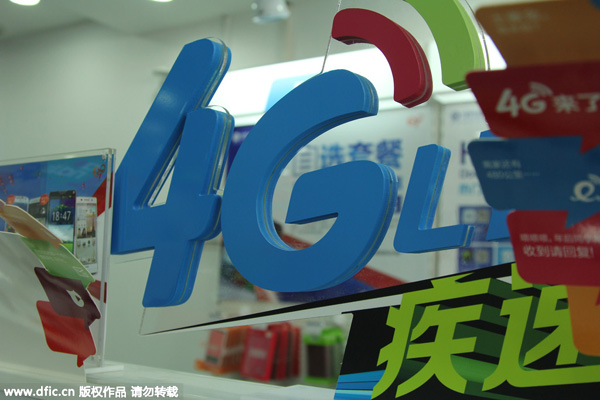 |
|
A signboard of 4G is seen at a branch of China Mobile in Shanghai, China, Dec 28, 2013. [Photo/IC] |
Ministry of Industry and Information Technology (MIIT) responded to Premier Li Keqiang's call to improve Internet services, saying it will urge companies to accelerate network speed and lower mobile Internet charges.
The construction of 4G network and speed enhancement will be this year's key focus, said the Ministry in a statement released on its website on Wednesday evening.
The Ministry has urged relevant enterprises to research and carry out detailed plans.
Premier Li said at a discussion about China's economy in the first quarter on Tuesday that the authorities should try to lower mobile data fees, and asked officials of relevant authorities to speed up coordination regarding the construction of telecommunications infrastructure.
When people go to a public place, they often want to know if there is free Wi-Fi, because mobile data is too expensive, Li said.
Related story: Premier calls for improved net speeds and bandwidth, by China Daily
In a meeting with entrepreneurs?and economists in Beijing on Tuesday, Premier Li Keqiang urged the head of the Ministry of Industry and Information Technology to lower the fees for mobile Internet users, expand the bandwidth and improve Internet speeds. Comments:
The government can open a free channel for mobile Internet users to access information on public health, security and some online learning. These are all important public products that the government should provide for the people.
Ding Lei, founder and CEO of NetEase, a leading Internet corporation based in Beijing, Apr 14
The government must further increase its input into IT infrastructure. There is a big gap in bandwidth between China and the developed countries, even some developing countries.
Hou Weigui, president of ZTE, a Chinese telecommunications company headquartered in Shenzhen, Apr 14
Premier Li's suggestion would not only benefit netizens, but also the national economy, especially those industries related to the Internet. But to realize a faster and cheaper Internet, the government needs to spend more money on it. Under the tightening of the government's budget and decreasing revenues, the government must think of ways to entice private investors to do the job, and combine it with reform of the lackluster State-owned telecommunications sector.
Li Ming, a middle school teacher in Zhuhai, Guangdong, in a forum on sina.com, Apr 14
The Chinese government vows to upgrade the manufacturing industry by 2025 by implementing its Internet Plus strategy, for which expanding the bandwidth of the Internet is the prerequisite. The convergence of the Internet and industry offers mutual advantages to improve productivity and operational efficiency.
A netizen in Jidong county, Heilongjiang province, named Summer, commenting on her blog, Apr 14
